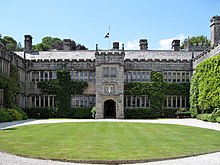| This article includes a list of references, related reading, or external links, but its sources remain unclear because it lacks inline citations. Please help improve this article by introducing more precise citations. (April 2016) (Learn how and when to remove this message) |
British Liberal politician
| Viscount Clifden | |
|---|---|
 | |
| Born | Francis Gerald Agar-Robartes (1883-04-14)14 April 1883 London, England |
| Died | 15 July 1966(1966-07-15) (aged 83) Cornwall, England, UK |
| Nationality | British |
| Occupation(s) | Diplomat and politician |
Francis Gerald Agar-Robartes, 7th Viscount Clifden (14 April 1883 – 15 July 1966), was a British Liberal politician.
Clifden was the second but eldest surviving son, due to his elder brother (Captain the Hon. Thomas Agar-Robartes) dying in the First World War). He was the son of Thomas Agar-Robartes, 6th Viscount Clifden, and his wife Mary (née Dickenson), and was educated at Eton and Christ Church, Oxford. In 1930, he succeeded his father in the viscountcy and to Lanhydrock House, and took his seat on the Liberal benches in the House of Lords.
From 1940 to 1945, he served as a Lord-in-waiting (government whip in the House of Lords) in Winston Churchill's coalition government.
In 1953, he donated the Lanhydrock House and approximately 160 hectares (400 acres) of parkland to the National Trust.
Death
Lord Clifden died in July 1966, aged 83. He never married and was succeeded in the viscountcy by his younger brother Arthur.
References
- Kidd, Charles, Williamson, David (editors). Debrett's Peerage and Baronetage (1990 edition). New York: St Martin's Press, 1990.
- Leigh Rayment's Peerage Pages
- Profile, thepeerage.com; Retrieved 3 April 2016.
| Peerage of Ireland | ||
|---|---|---|
| Preceded byThomas Charles Agar-Robartes | Viscount Clifden 1930–1966 |
Succeeded byArthur Victor Agar-Robartes |